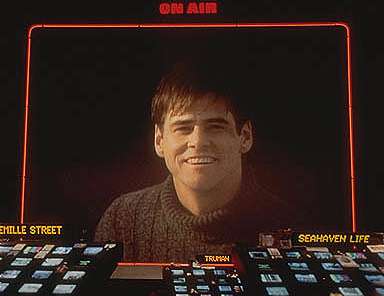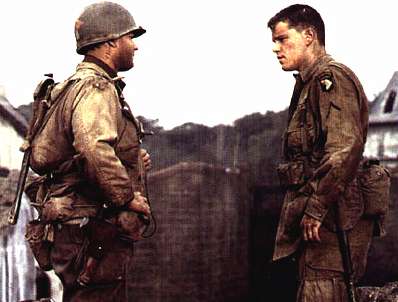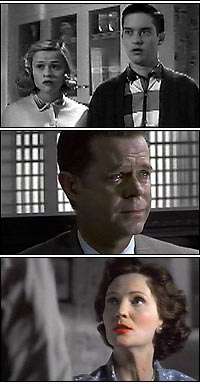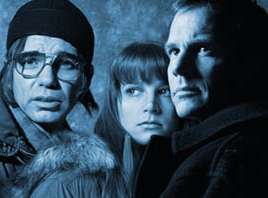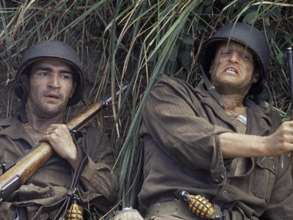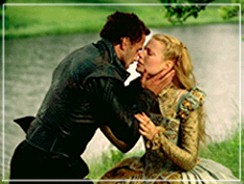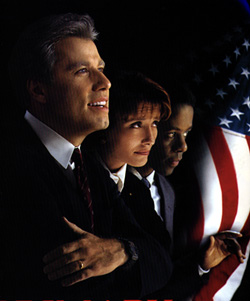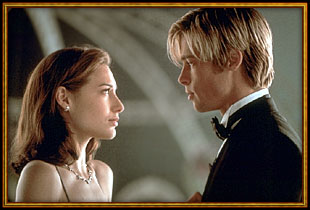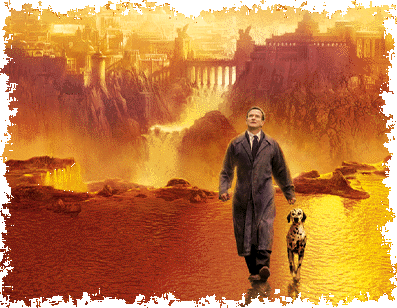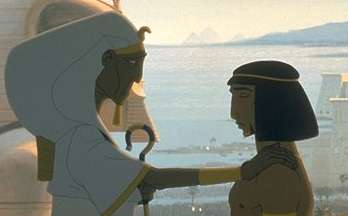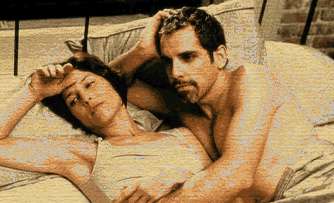|
OF 1998 
This year again presented a very tough choice for the number one spot on my list. But finally, "The Truman Show"
prevailed, for a number of reasons. Who would have ever thought that a film starring Jim Carrey would not only be my
selection for the best film of the year, but that it would win out over a highly acclaimed film by Steven Spielberg? But it's true.
"The Truman Show", released in the summer, is my choice for the best film of the year for several reasons. In a year when
we saw so many great films which dealt with ideas, "The Truman Show" topped them all. "The Truman Show" is one of the
most original, thought-provoking, and daring films to come along in quite some time.
Jim Carrey, in a stunning departure from his usual comic goofy persona in so many forgettable films, takes on a straight,
dramatic role, and in doing so, provided one of the best performances by an actor this year. Carrey is Truman Burbank,
a man who has been the unwitting star of a 30-year old television show, broadcast live 24 hours a day, showing
Truman's life. He was adopted by a corporation, and as controlled by Christof (another brilliant performance by Ed Harris),
he lives on Seahaven Island, which is actually an entire city enclosed in a man-made structure. Over 5000 hidden
cameras provide constant coverage of Truman's life, as he interacts with the people around him, who are all actors and all know
the truth. The show is one of the highest rated around, and now as Truman is older, strange things begin occurring, and he
wants to discover what is going on. The film details his slow discovery of something wrong in his world, and his desire
to break free and leave Seahaven Island. It's an incredible story on its own, as Truman finally risks everything, including his life,
to break free (in an incredibly inspirational scene), and then finally reaches the end of his world, where he discovers the
truth about his entire life.
Above all, this brilliant film by director Peter Weir (his best by far), embodies ideas ... in the age we live in now, where
people on the internet already set up webcams to allow people to watch their everyday lives unfold, where reality shows
often beat fictional dramas in the TV ratings, new issues of privacy and what is reality have come to the forefront, and what's scary
about "The Truman Show" is that we understand that this could happen ... and imagine the ratings it would get. As
Christof tells us at the very beginning of the film, "We've become bored with watching actors giving us phony emotions."
The audience is starving for authenticity and reality. And "The Truman Show" delivers it ... this film brings up so many
ideas, and this is something so rare in contemporary movies ... a film about ideas. In a world where we've already seen
a child born live over the internet for anyone to see, "The Truman Show" rings closer to home each and every day. And in addition to having
some incredibly humorous moments, the film leaves the moviegoer with plenty of ideas to discuss later, as it manages
to discuss issues about conformity, commercialism, the desire to play god, and what can happen when television
blurs the lines between reality and what's on the screen. And one of the more interesting ideas it left me with : Christof
at one point says "We accept the reality of the world we're presented" -- interesting indeed. Truman accepts the reality
of his world, and we accept the reality of ours. Suppose one day we were to discover that we were just the unwitting
participants of someone's enjoyment, boxed up in a little world, and everyone around us are actors. And one day
we'll find the wall and break free. Any film that can leave people discussing such large ideas is a worthy film, and
"Truman Show" embodies those ideas in a richly written story, with incredible acting on all parts. A truly memorable film
experience, and a classic of cinema which deserves to be remembered for a very long time.
It was a tough choice between Numbers 1 and 2 this year, because Steven Spielberg's achievement in "Saving Private Ryan"
is nothing short of remarkable. Spielberg, once known only for hugely successful blockbusters like "E.T." and "Jurassic Park",
has proved himself a much more mature and skilled film director in the 90's. Coming on the heels of "Amistad", and just a
few years before, with the magnificent "Schindler's List", Spielberg nearly tops himself with this, in my opinion the greatest war film
ever made. Never before has war been portrayed in the style it is portrayed in this film. You realize from the very beginning
that this is going to be a very different World War II film than any other ever made, and it is. Spielberg opens the film
with 30 minutes of cinema which easily rank as one of the most powerful, most horrific, and technically proficient achievements
ever put on film. It's D-Day, and groups of American soldiers are landing on Omaha Beach in Normandy, an historical event portrayed
many times on film, but never before like this. As the landing ships make their way to the beach, we see the faces of soldiers, and
we feel the tension and the dread ... this is reality, as close to reality as can be portrayed on film. As soon as the landing gates
open, German weapons fire rips through soldiers before they can even get on the beach. It's a massacre right from the start,
and the technical proficiency that Spielberg demonstrates in these opening moments is nothing short of pure genius.
The sequence never lets up, never allowing the audience to escape from the horror. Spielberg makes us feel that we are one of the
soldiers on the beach that day, as he films the scene in muted colors, making the carnage seem even more horrific. In addition,
a number of scenes are shot from a soldier's viewpoint, and we see the utter chaos and tragedy of the entire scene. He cuts
quickly from one horrific event to the other ... bodies being blown apart, a soldier searching for his severed arm, boatloads
of soldiers meeting death in the most horrific ways possible. The sound
is used to incredible effect in this sequence, as we hear bullets zinging by and penetrating flesh, more real than any other film
has never managed to do. The sequence is mesmerizing and overwhelming, a cinematic tour de force the likes of which we'll never see again.
It is certainly the most violent, gory, visceral depiction of war ever placed on film.
The film is still genius once this sequence is completed ... it again embodies ideas, as it tells the story of a platoon, led by Tom Hanks,
in another incredible performance (can this guy give a bad performance??), risking their lives to search for a Private Ryan, whose
other three brothers all died in combat. The question raised is this ... are the lives of eight men worth the lives of one man, under
any circumstance? Even during these sequences, we are seeing war and experiencing it just as it really happened (as several
veterans did attest to after seeing the film). The final battle sequence of the film is as equally powerful as the opening, shot
almost in a documentary style. "Saving Private Ryan" is a mesmerizing experience, a triumph of cinematography and sound and
everything technically possible in the cinema right now, and is another example that Steven Spielberg is not just a Hollywood mogul and
power producer, but a director with vision and skill, who is now contributing to the cinema and to our culture historical epics
which bring history to light in ways never before possible. We've lived the Holocaust and slavery through Spielberg's eyes so far,
and now we experience World War II, and war in general, through this film, a haunting reminder of the real men who fought and
died in that war -- not the John Wayne supermen storming the beach. It's a tragic reminder of what it was like to be in the madness of war. This film is one of the best examples
of a skilled director with a passion for his story, and another example of the cinema's power to bring history to our psyches, to live
it and fully experience it. Like a critic once said, this is not your father's war movie, this is your father's war.
Funny how two of the best films of the year were movies with television as a basic theme element. "Pleasantville" was a
very, well, pleasant surprise. Very little hype greeted the arrival of this film, and it is a gem. It begins as a simple little film
where two young kids of the 90's, a brother and sister, are zapped into their television set, and into the television world of the
1950's sitcom, Pleasantville. They now exist in a black and white world, and the movie is very enjoyable and funny as we see the
hilarity of the idealized 1950's world as experienced by two 90's teenagers. If this all the movie were, it wouldn't necessarily
be anything special. But then, something truly magical begins to happen ... the two teens, particularly the sister, begin to
try to change things in this repressed world, and splashes of color begin appearing through the Pleasantville world. It's
a fascinating idea ... when someone accepts a challenge or unleashes what was earlier repressed, be it their artistic nature, or
their sexual longings, or experiencing great literary works, they turn to glorious color, and the director, Gary Ross, along with his
cinematographer, show visually how some remain black and white and others are budding into color. Soon, the town is wondering
what is happening, and the film becomes a very interesting case study of topics faced by our own society, such as racism,
freedom of speech and artistic expression, and most importantly, the ability to change. This movie is a very uplifting and
hopeful movie, as we learn that change can indeed set us free. We must unleash what's hiding underneath. It was indeed a
surprise to see this simple film become something so much more brilliant, and it's all done effectively with marvelous performances
by William H. Macy, Joan Allen, and particularly Jeff Daniels. This is a memorable little gem, and clearly one of the year's best films.
Sam Raimi, usually known for directing horror films, becomes a respectable director with this incredible effort, another surprise from
1998's group of films. The story is a thriller of sorts, telling the story of a group of three men who stumble upon a plane crash.
They find $4 million on the plane, which they figure is drug money, and agree to a simple plan to take the money. What unfolds
from there is a brilliant story of how the plan falls apart, and what happens to the individuals involved. It's cleverly written, and I
was particularly impressed with the performances by all, especially Bill Paxton (not usually known for great performances), Bridget
Fonda, and particularly Billy Bob Thornton (this guy should just set up residence in my supporting actor category because he's always
so good.) This film avoids the many pitfalls which could make this a lesser film ... instead we are captivated by watching what taking
this money does to each of these people's lives. The film is so interesting, as it follows three normal men (it could be any one of us),
and then slowly shows how the plan unravels, and the terrifying consequences of what keeps occurring. It's an incredibly dark film,
but punctuated by a well written story, with deeply drawn characters. Thornton is especially effective, especially in scenes where he
reveals the sadness of his character, particularly when discussing how he has never been with a woman, and hoping the money
could help change that. The ending is harrowing and tragic, and by the end, we've endured a tough, dark examination of the human
soul, and what can happen when the "American dream is stolen, not earned."
The reclusive director Terrence Malick, known for only directing two incredible films from the 1970's, made the year's other
anticipated World War II epic with the adapation of James Jones's novel, "The Thin Red Line." The result is an extremely powerful
and very different war film -- the plot is essentially the Battle of Guadalcanal in the Pacific, but more than that, this film is about
the mindset of the men fighting that battle. Narration from all the different characters tells us what is going on in their heads, and
the film is an incredible philosophical examination of the inherent nature of man to kill other men. One of the most effective
things in the film is something I haven't yet seen done in a war film. One character we follow is a Private Bell, and as Bell
experiences the horrors of war, Malick intercuts scenes of him back at home with the woman he loves. These tender moments
of love edited amongst scenes of tense warfare and bloody carnage are incredibly effective at portraying what goes through men's minds in war.
He keeps thinking back to those moments of love, and it's tragic to see him stuck in the war. A very emotional addition to the film,
used several times to wonderful affect.
Malick's writing is incredible,
and the images are truly mesmerizing and beautiful at the same time. Although not as powerful and affecting as Spielberg's take
on World War II, it's still a magnificent achievement. Solid performances by Nick Nolte, Sean Penn, and several other
less well known actors, particularly Elias Koteas, make this another powerful testament to man's inhumanity to man, and deserves to sit proudly with
some of the greatest war films of all time. It was so good to see Malick back in the director's chair, and the film does not
disappoint.
A surprising little gem, this was a very enjoyable comedy, which brilliantly brings to life the author himself, William Shakespeare,
telling the story of his own personal love, which provided the inspiration for his landmark play, Romeo and Juliet. Joseph Fiennes
is absolutely brilliant as Will Shakespeare, bringing a vibrancy to the Bard, making us feel as if we have actually travelled back
in time, and are being let in to peak at the genius of this author. Gwyneth Paltrow is stunning and captivating as Viola, the woman
he so passionately falls in love with against the rules of England at the time, as she has been bought for marriage by Lord Essux. What
is so brilliant and enjoyable about this film is that we see the workings of a mind of a writer, in this case one of the greatest
writers who ever lived. We see the process of his writing one of his most famous plays, and how so many of the events were triggered by his
own personal love. But it is also a moving and tragic love story as well. The costumes and set design are impeccable, evoking the
period so wonderfully. Geoffrey Rush and Judi Dench give memorable supporting performances as well. This film is a triumph
of writing, and particularly the performances of this ensemble. Definitely one of the year's best films.
The book, written anonymously, was a sensation, and the film, although fictional, is a very insightful look into the lives of our current
President and First Lady. John Travolta gives a magnificent, Oscar worthy performance as Jack Stanton, a governor of a Southern state
(just like Bill Clinton) who is running for President. Travolta looks and acts just like Clinton, so it's impossible to avoid the
comparisons between this fictional story and the lives of Bill and Hilary Clinton. Just being fictional, the film is a very enjoyable look
at politics in the 90's. Acclaimed director Mike Nichols brings out incredible performances from not only Travolta, but also
Emma Thompson, Billy Bob Thornton, Adrian Lester, and particularly Kathy Bates, who represents the moral soul of an America
still hoping it has one. Her breakdown when she realizes that the Stantons will go to any lengths possible to win the Presidency,
even if it's wrong, is one of the most tragic moments in the film. A very insightful film into the politics and scandals that have
shook Bill Clinton's presidency, and a very insightful examination into the marriage, as Emma Thompson makes us imagine how
Hilary puts up with the things she has, and we get a better idea of how they do stay together. The film is interestingly enough
not told from the Stanton's point of view, but instead we see them through the eyes of the Henry Burton character, played
incredibly well by Adrian Lester. It is much more effective to see the film this way, because Burton is the outsider coming into
this situation, just as we, the audience members, are.
Another film about ideas, this is about the idea of Death taking on human form (in the person of Brad Pitt) and coming to
Earth to experience life as a man before he takes the life of one particular man, played incredibly well by Anthony Hopkins.
The three hour film, directed by Martin Brest, is a very powerful story, most incredibly as we watch Hopkins try to control
and prepare for his ultimate certainty. The whole strength of the film comes from Hopkins, but is also carried by Claire
Forlani, who portrays Hopkins's daughter. Death falls in love with her, and in an extremely sensual and emotionally
powerful scene, when the two finally make love, Pitt's reactions to the feelings of sex and love is priceless. Thomas Newman's
score for the film is clearly the best of the year, and although criticized by some as overly long and pretentious, I thought
this film was a very admirable effort, and was a very enjoyable and thought-provoking film.
Vincent Ward directed this breathtaking and thoroughly original film, which contains some of the most beautiful, imaginative,
and stunning visuals I have ever seen brought to a movie screen. It's an example of what filmmakers can truly accomplish with
the visual and technical abilities of computers nowadays, and it's brought to stunning effect in yet another film which is about ideas. Robin
Williams and Annabella Sciorra are soul mates, so very much in love. In the opening moments of the film, they lose their two kids
in an auto accident, and soon after, Williams is also killed. We then see his spirit wandering around Earth watching his wife deal
with the loss, until finally, he arrives in heaven. His arrival into heaven are when the visual treats begin. Computer animation
makes it possible to see a heaven so glorious it's unlike anything you've ever seen before on screen. The visuals are truly
breathtaking ... these could be paintings they are so beautiful. His wife soon commits suicide, sending her soul to hell for
all eternity. The story involves Williams's search for his wife, which eventually brings him to hell, also visually imagined
with some stunning visuals, including a scene of rows of heads of all of the lost souls in hell, an image which I will never forget.
The film contains very effective performances by all, but this film will be remembered for a long time for its visuals. Each person
makes their own heaven, according to this film. If it can be this visually beautiful, I for one will be very happy about arriving
there. A film like this could not have been possible twenty years ago, around when the novel is written. It's getting more and more
possible now to make imagined worlds reality on screen, and this film is a shining example of bringing a good story to the latest
technical advances, and producing something truly wonderful and memorable. There are images in this film I will not soon forget.
The Dreamworks Studio presented the first real challenge to Disney's stranglehold on animated films with two films this year,
but this more conventional animated film made it onto my top ten list. With this film, Dreamworks proved that animation
can be used for more serious adult films instead of cutesy films for kids. This is of course an adaptation of the Biblical story
of Moses -- it tells the story all the way up to the parting of the Red Sea, one of the grandest miracles of the Bible. And
the brilliance of the animation in this film truly shines in this sequence, as it becomes obvious that animation was the only true way to
show the parting of the Red Sea. It makes DeMille's parting of the Red Sea in the 1956 "Ten Commandments" look very
bland by comparison. The film is brilliantly animated (the first studio other than Disney to achieve such a high level of
animation quality), brilliantly scored, contains very good and well written songs, and is a powerful look at the future of animation, to
tell more adult stories and tell them brilliantly.
Ok, I had to have a Top 11 this year! Director Neil LaBute, who created the stunning dark film "In The Company of Men", returns with an even darker look at
the lives of both men and women, completely selfish men and women, and the lives they lead. The film is a sexual dark
comedy, telling the story of upper to middle class men and women, all entangled in varying acts of sexual infedility and sexual
problems. The film is richly written, and the characters are deeply drawn and presented. Jason Patric is particularly effective,
especially in a scene when he reveals the greatest sex he ever had ... the way he tells it is chilling. All of the performances are
good, and even though we probably wouldn't want to associate with these people, the truth is we probably already do ... and more
than likely, those characters are us.

ONE TRUE THING  |
